Five years ago, Tatiana Cames renovated her recently-purchased townhouse in Clinton Hill with the hope of producing rental income from part of the building. However, Cames, who is a real-estate agent, was unable to rent the two-bedroom, floor-through apartment at the price she had hoped for. Instead, a friend recommended she try Airbnb.
She was skeptical, since the home-sharing website, founded in California just three years earlier, was barely out of its startup phase. But Cames quickly realized how many tourists, charmed by the townhouse and the neighborhood, wanted to stay in her house. “It was immediately popular,” she told The Bridge. “A lot of people enjoy being in a real neighborhood, coming home to somewhere quiet.”
In 2015, Cames and her ex-husband decided to purchase another townhouse in Bedford-Stuyvesant, where they expanded their Airbnb operations. “That’s when everything went to chaos,” she said.
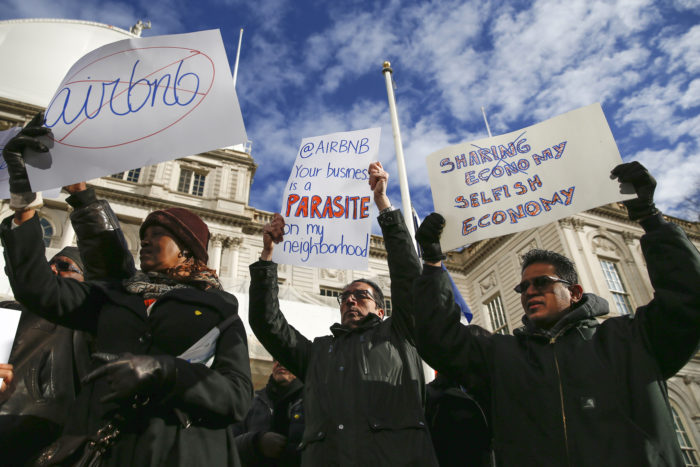
Opponents of Airbnb rally before a hearing at City Hall in 2015. The hotel industry and labor unions have lobbied for limitations to the home-sharing service (Photo by Shannon Stapleton)
Her ex-husband and daughter kept apartments there, while offering five Airbnb listings throughout the home. After a neighbor complained about Airbnb operations on the block, the city inspectors came. “They decided to find a slew of reasons why [Airbrb] wasn’t justifiable,” she said, “Because even though we lived there, it was a multi-family building.” (The New York State Multiple Dwelling Law has been interpreted to prohibit such buildings from being rented as separate Airbnb units.)
The timing for Cames wasn’t good. The mayor’s Office of Special Enforcement had just begun to enforce a new state law designed to stop people from illegally advertising transient rentals. Cames was one of the first to be targeted, racking up five violations and a $5,000 fine. Ultimately she paid the fine and shuttered all Airbnb operations, in the process losing the estimated 30% portion of her income she had earned through house sharing.
While Cames is out of the Airbnb business, she’s frustrated that many others have managed to continue. “There’s more Airbnb than ever,” she said. “The rules are not clear at all.”
Indeed, New York is Airbnb’s third-largest market (after Paris and London) and home to tens of thousands of hosts. Roughly 21,400 hosts operate in Brooklyn alone, an Airbnb spokesperson told The Bridge, with 25,000 more across Manhattan.
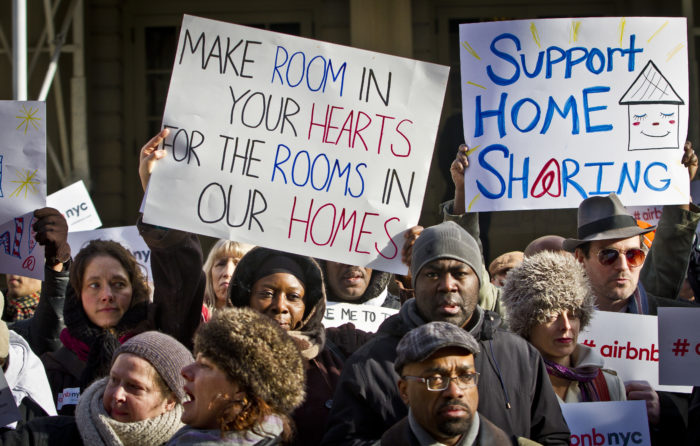
Supporters of Airbnb hold a rally outside City Hall, also in 2015. Airbnb hosts say that income from renters helps them afford housing costs (Photo by Bebeto Matthews/AP)
But as Airbnb use proliferates throughout Kings County, legal gray areas and confusion remain. Airbnb is lobbying on one side to protect its business against tightened regulation, with plenty of money and motivation. It’s the second-largest recent startup after Uber, with a valuation of about $30 billion.
On the other side is the hotel lobby and its employee unions, which see Airbnb as a threat to business. In the middle of the debate, with differing opinions, are elected officials, housing advocates, and even Airbnb hosts. Ultimately there remain major disagreements on how home sharing should be regulated, how Airbnb contributes to gentrification, and who, exactly, is benefiting most from Airbnb.
Airbnb’s Widespread Effects
One thing’s for certain: Airbnb has changed the landscape of Brooklyn tourism–and possibly real estate as well.
In 2017 alone, according to Airbnb, its New York hosts housed more than 1.8 million guests–people who ditched New York’s traditional hotel districts to settle into a neighborhood, at least temporarily. “It was really cheaper and besides, we enjoy staying in an apartment more than a hotel,” said Mariana Sosa, who visited with her boyfriend from Buenos Aires, Argentina, and stayed 20 days in Crown Heights in March. “That we feel ‘at home’ is important to us,” she said.
In their case, the visit was prompted by the wedding of a family friend in Williamsburg. But Brooklyn has become a tourist destination in its own right. The industry accounts for nearly 10% of the jobs in the borough, with employment growing at almost 10% per year since 2012, according to a report from the Brooklyn Chamber of Commerce.
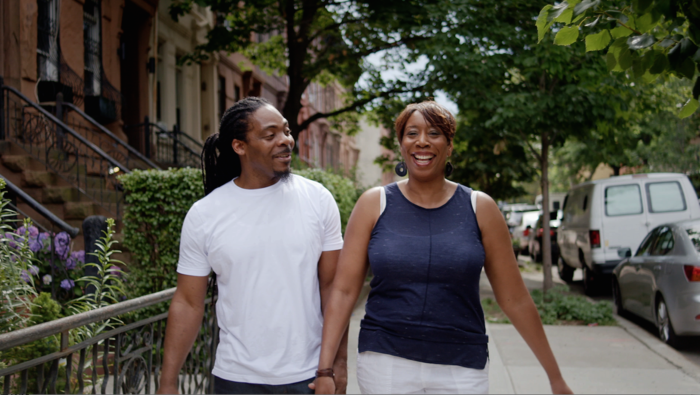
Pela and Richelle Burnette, who rent out the top floor of their Bed-Stuy home, have become vocal advocates of home sharing (Photo courtesy of Airbnb)
Hotel developers are catching up: Brooklyn now has 50 hotels up and running and another 40 in the pipeline. But Airbnb puts visitors in the heart of charming residential neighborhoods, which aren’t zoned for hotel development like less-charming areas of Gowanus and Downtown Brooklyn, at a generally cheaper price.
Dealing With the ‘Bad Actors’
As New York has ramped up Airbnb enforcement, there does seem to be one issue that unites most players. That’s about Airbnb rejecting its “bad actors”: landlords who keep multiple apartments across buildings off the market to rent through Airbnb. “We are primarily concerned about rent-stabilized units being warehoused by landlords [through Airbnb],” said Rolando Guzman, a deputy director with St. Nicks Alliance, a North Brooklyn nonprofit that works in housing advocacy. “We don’t have an issue with a property owner renting a room to subsidize their mortgage,” he said.
To fight against the bad actors, Airbnb implemented a “One Host, One Home” policy, in which hosts are required to put all their home listings at one, discrete address. And under New York State Law, the homeowner must be present while renting. But a 2018 report by the School of Urban Planning at McGill Institute found 87% of entire-home reservations to be illegal under New York law, which means that 66% of rental revenue ($435 million) and 45% of all New York Airbnb reservations in 2017 were illegal.
To have better access to hosts, the City Council is crafting a bill to require online home-sharing companies to provide the Mayor’s Office of Special Enforcement with the addresses of their listings, which Airbnb plans to oppose.
The legislation has the support of the hotel industry and organized labor. A sizeable media campaign was funded by the state Hotel and Motel Trades Council, a union for hotel and gaming workers, which has made the issue a top priority this year. The industry asserts that Airbnb hosts don’t offer fire-safety, disabilities-law compliance, and other features hotels provide, said Vijay Dandapani, president and CEO of the Hotel Association of New York City.
In Brooklyn, Dandapani notes, Airbnb has been able to tap into markets the hotel industry cannot. “Neighborhoods have not had hotels for a couple of reasons,” he said. “They were zoned residential, and when zoning changes were, and are, allowed, the mushroom growth of Airbnb’s illegal listings preclude the development of hotels, which typically requires a three-plus-year development horizon.”
The Effect on Traditional B&Bs
As Airbnb threw the hotel industry into defense mode, it sent Brooklyn’s bed-and-breakfast operators into total confusion. Don M., who asked that his last name not be used, opened a bed and breakfast ten years ago in Park Slope, when B&Bs operated in “a gray area,” he said. (New York City is one of the only major U.S. cities without a regulatory framework for the business model.)
“As long as none of the neighbors complained, or we weren’t putting anyone in danger, the city didn’t worry too much about our operations,” he said. “We’d been operating fine for all these years. And then, along comes Airbnb.”
The recent Airbnb crackdown left B&B owners unsure where they stand with the city, especially after the highly-publicized shutdown by the Office of Special Enforcement of the Bed-Stuy brownstone where Spike Lee’s Crooklyn was filmed, a B&B not listed on Airbnb.
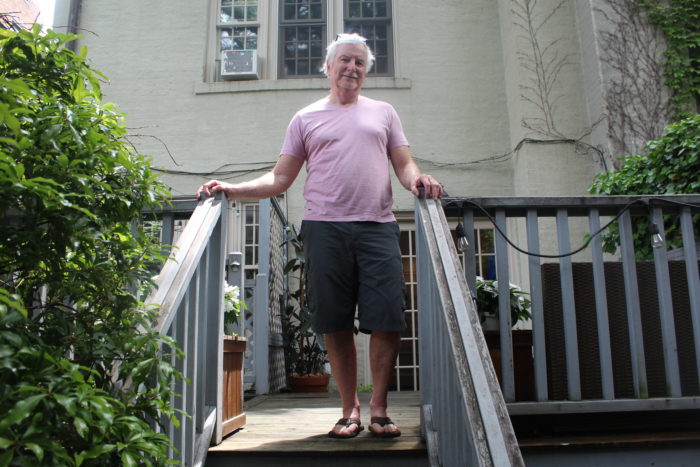
Don M., who asked that his last name not be used, opened a B&B ten years ago in Park Slope. Attempts to clamp down on Airbnb has thrown the legal status of B&Bs into confusion, he says (Photo by Arden Phillips)
That news contributed to the decision by Don M. to temporarily shutter his business. He’s counting on separate legislation, introduced at the request of Borough President Eric Adams, to provide relief and protections to entrepreneurs operating B&B operations within their homes.
While Airbnb doesn’t plan to support the City Council bill requiring the company to disclose addresses to the Office of Special Enforcement, it has thrown its support behind legislation introduced by Brooklyn Assemblyman Joe Lentol, of North Brooklyn, to amend the multiple-dwelling law, which prohibits rentals of fewer than 30 days in New York City apartment buildings unless the owner is present.
“I got flak for drafting that bill with Airbnb,” Assemblyman Lentol told The Bridge. “But the genesis of the bill is because my constituents rely on home sharing to supplement their income,” he said. “[Airbnb] is here to stay–they’re not going anywhere,” he added. “So why not legitimize it?”
What Do the Numbers Say?
Murray Cox, a community activist living in Bed-Stuy who is behind the independent website InsideAirbnb.com, doesn’t think the bill does enough. “I mean, it was written by Airbnb,” Cox said. He believes the city should pass laws closer to those in San Francisco, which limit home rentals by absent tenants to 90 days per year–though owners can rent them year-round if they live there–and compels Airbnb hosts to register with the city. As for the 90-day law, Cox said, “Lentol’s bill doesn’t do that.”
The fundamental socio-economic debate over Airbnb is whether the positive effects (helping owners earn extra income while supporting local-business growth) outweigh the negative ones (contributing to gentrification and rising housing costs). Efforts to quantify those factors have sometimes been flawed or misleading.
A controversial report released in May by Comptroller Scott Stringer found Airbnb responsible for nearly 10% of citywide rent-price increases between 2009 and 2016. In Greenpoint and Williamsburg, according to the report, average rents increased by $659 between 2009 and 2016, of which $123 was attributed to Airbnb’s growth. Stringer’s report, however, was rebutted by the firm that had originally gathered the data, saying that it had been misconstrued. Airbnb, for its part, shot back that Stringer inflated the number of apartments tied up by short-term rentals.
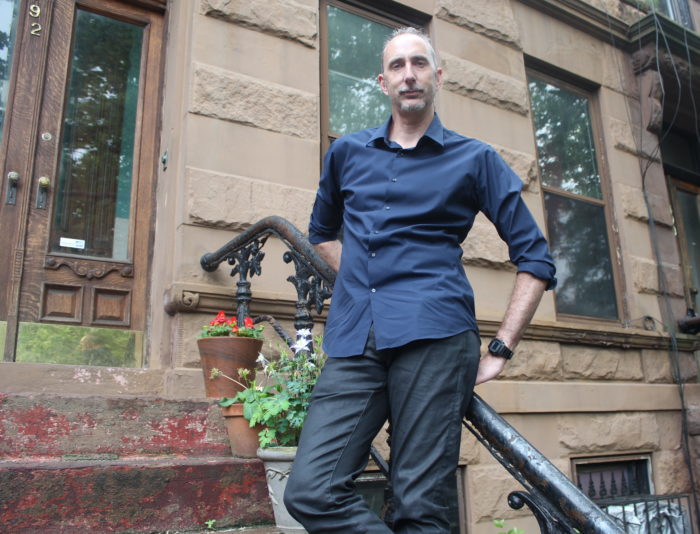
Says Murray Cox, who runs the website InsideAirbnb.com: “Airbnb’s messaging is that this is good for working-class residents. The data tells a different story” (Photo by Arden Phillips)
While the report contended that Airbnb is “exacerbating NYC’s affordability crisis,” Airbnb hosts argue that it fosters stability among homeowners in changing neighborhoods. “Gentrification has already been going on in Bedford-Stuyvesant,” said Richelle Burnett, a lifelong Bed-Stuy resident who rents out the top floor of her brownstone through Airbnb and has become a vocal advocate of home sharing. “One of the ways people are staying in the community is Airbnb. Otherwise they’d be priced out.”
“I am a regular New Yorker, but I cannot afford my house without Airbnb,” said Evelyn Badia, a Park Slope host who’s turned her home-sharing expertise into a business. “I’ve been in my house for 14 years, in the neighborhood for 23 years. I’m Latina. If I cannot afford my house,” she asks, “Who do you think will move in?”
Cox challenges the narrative of who benefits most from Airbnb. His website published a report last year that found across all 72 predominantly black New York City neighborhoods, Airbnb hosts are five times more likely to be white. The report also noted the loss of housing and neighborhood disruption due to Airbnb is six times more likely to affect black residents, since the demographic composition of these neighborhoods overall is 14% white and 80% black.
“Airbnb’s messaging is that this is good for working-class residents,” said Cox. “The data tells a different story.”
Does Airbnb Help Local Business?
Airbnb also touts its partnership, started in 2015, with the Brooklyn Chamber of Commerce to support local business in residential areas without hotels. “Airbnb hosts in our community regularly direct guests to our local restaurants, stores, mom-and-pop shops and retail corridors,” reads a statement by the chamber. “These guests patronize some of Brooklyn’s lesser-known neighborhoods that may not see as much foot traffic otherwise.”
Cox pushes back on that narrative too, asking which businesses see the most benefit. “Tourists are more likely to frequent gentrifying businesses, restaurants and bars,” he said. “And they’re still going to Manhattan, because that’s where most tourists go.” He doesn’t believe tourism dollars should be prioritized over residents at risk of being displaced by Airbnb, who “spend their money in broader, more diverse ways than tourists.”
Finally, there’s the matter of enforcement, as the Mayor’s Office of Special Enforcement has ramped up on highly-publicized Airbnb shutdowns. Like Cames, other hosts spoke to the continuing confusion about what’s legal and what isn’t.
“It feels like the city is coming after us, and there’s no clear legislation [around Airbnb],” host Badia says. Since 2011, she has spoken to legislators in Albany and City Council members about the issue. Back then, she said, “I was told I’m legal and don’t need to worry about it.” Now, she said, the conversation has changed to variations of “You’re legal, but…”
Badia’s entire livelihood is wrapped up in Airbnb, and she talks about her hosting experience with genuine fondness. “The reality is, we want to do this right,” she said, adding that she feels there’s no productive conversation happening right now between the city, the hosts, and Airbnb itself.
“We’re not Airbnb,” she said of her role as host. “We are your city, we are your constituents, we are here. We are your people.”